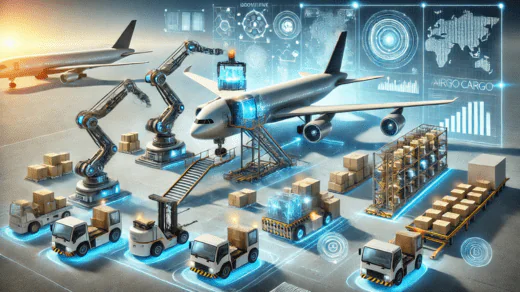The Technology Behind Modern Air Cargo Charters

In today’s fast-paced global economy, the air cargo charter industry plays a vital role in ensuring that goods reach their destinations efficiently and securely. Advancements in technology have revolutionized the way cargo charters operate, making them more reliable, transparent, and cost-effective than ever before. These innovations are not only improving logistics but also reshaping the future of air freight.
Real-Time Tracking Systems
One of the most significant advancements in air cargo charters is the implementation of real-time tracking systems. These systems provide customers with live updates on the location and status of their shipments, offering a level of transparency that was previously unattainable. By using GPS and satellite technology, companies can monitor cargo in transit, ensuring that goods are delivered on time and intact.
Real-time tracking is particularly valuable for high-value or sensitive shipments, such as pharmaceuticals or electronics. It enables immediate intervention in case of delays or issues, minimizing risks and enhancing customer confidence.
Artificial Intelligence and Data Analytics
Artificial intelligence (AI) and data analytics are transforming air cargo charters by optimizing routes, reducing fuel consumption, and predicting potential disruptions. AI-powered tools analyze vast amounts of data, such as weather conditions, air traffic, and logistical constraints, to create the most efficient flight plans.
Moreover, predictive analytics allow charter companies to anticipate demand fluctuations, helping them allocate resources effectively. This technology ensures that aircraft are used to their full potential, reducing operational costs and environmental impact.
Blockchain for Enhanced Security and Transparency
Blockchain technology is gaining traction in the air cargo industry as a tool for enhancing security and transparency. By creating immutable records of every transaction and shipment, blockchain reduces the risk of fraud and errors. This is especially crucial for industries like pharmaceuticals and luxury goods, where the integrity of shipments is paramount.
Smart contracts—an application of blockchain—automate processes such as payment releases and customs clearance, streamlining operations and reducing paperwork.
To learn more about how these technological advancements are impacting the air cargo industry, you can explore further details here.
Internet of Things (IoT) for Smarter Cargo Monitoring
The Internet of Things (IoT) has enabled the development of smart sensors that monitor cargo conditions in real-time. These sensors can track variables such as temperature, humidity, and pressure, ensuring that sensitive goods like food and medicine are transported under optimal conditions.
IoT technology also enhances efficiency by enabling proactive maintenance of aircraft. Sensors installed on planes can detect mechanical issues before they become critical, reducing downtime and ensuring operational reliability.
Sustainable Technologies in Air Cargo Charters
As the world becomes more focused on sustainability, air cargo charters are adopting eco-friendly technologies to reduce their environmental footprint. Advances in fuel efficiency, the use of sustainable aviation fuel (SAF), and lightweight aircraft materials are helping to minimize emissions.
Additionally, route optimization software reduces unnecessary fuel consumption by identifying the most efficient flight paths. These technologies align with global sustainability goals while maintaining the high-speed delivery that charters are known for.
For those interested in exploring how these sustainable practices are shaping the future of air cargo, further information is available here.
Autonomous Drones and the Future of Air Freight
One of the most exciting technological advancements on the horizon for air cargo charters is the development of autonomous drones. These unmanned aerial vehicles (UAVs) are being designed to handle smaller, high-priority shipments with unparalleled speed and efficiency. Unlike traditional aircraft, drones can bypass congested airspace and land directly at designated points, reducing delivery times dramatically.
Drones are particularly well-suited for last-mile logistics in remote or hard-to-reach areas. Companies experimenting with this technology are exploring its potential for use in humanitarian missions, such as delivering medical supplies to disaster-stricken regions. While widespread adoption of drones faces regulatory and logistical hurdles, their integration into air cargo charters could redefine the industry.
Enhanced Customer Experiences Through Digital Platforms
Technology is not only transforming the operational aspects of air cargo charters but also revolutionizing the customer experience. Digital platforms now allow clients to book, track, and manage shipments with ease. These platforms provide real-time updates, estimated delivery times, and customizable options for specific freight needs.
Additionally, the integration of AI-powered chatbots ensures that customer queries are handled efficiently, enhancing overall satisfaction. By streamlining communication and providing greater visibility, these platforms make the entire process more accessible and user-friendly for businesses of all sizes.
The Future of Air Cargo Charters
With the continuous evolution of technology, the air cargo charter industry is poised for even greater advancements. Innovations such as autonomous cargo drones and artificial intelligence-driven logistics systems are already on the horizon, promising to further revolutionize the sector.
These technologies not only improve efficiency and security but also enable the industry to meet the growing demands of global trade. By embracing these advancements, air cargo charters are solidifying their role as an indispensable component of modern logistics.





